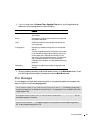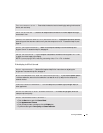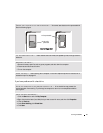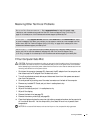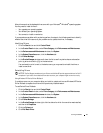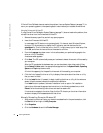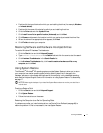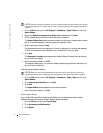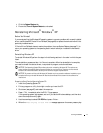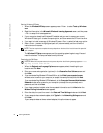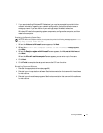
Solving Problems 69
Many drivers such as the keyboard driver come with your Microsoft
®
Windows
®
operating system.
You may need to install drivers if:
• You upgrade your operating system.
• You reinstall your operating system.
• You connect or install a new device.
If you experience a problem with any device, perform the steps in the following sections to identify
whether the driver is the source of your problem and to update the driver, if necessary.
Identifying Drivers
1
Click the
Start
button and click
Control Panel
.
2
In the
Control Panel
window, under
Pick a Category
, click
Performance and Maintenance
.
3
In the
Performance and Maintenance
window, click
System
.
4
In the
System Properties
screen, click the
Hardware
tab.
5
Click
Device Manager
.
6
In the
Device Manager
window, scroll down the list to see if any device has an exclamation
point (a yellow circle with a [
!]
) on the device icon.
If an exclamation point is next to the device name, you may need to reinstall the driver or
install a new driver.
Reinstalling Drivers
NOTICE: The Dell Support website and your Drivers and Utilities CD provide approved drivers for Dell™
computers. If you install drivers obtained from other sources, your computer might not work correctly.
Using Windows XP Device Driver Rollback
If a problem occurs on your computer after you install or update a driver, use Windows XP Device
Driver Rollback to replace the driver with the previously installed version.
To use Device Driver Rollback:
1
Click the
Start
button and click
Control Panel
.
2
In the
Control Panel
window, under
Pick a Category
, click
Performance and Maintenance
.
3
In the
Performance and Maintenance
window, click
System
.
4
In the
System Properties
screen, click the
Hardware
tab.
5
Click
Device Manager
.
6
In the
Device Manager
window, right-click the device for which the new driver was installed,
and then click
Properties
.
7
Click the
Drivers
tab.
8
Click
Roll Back Driver
.



